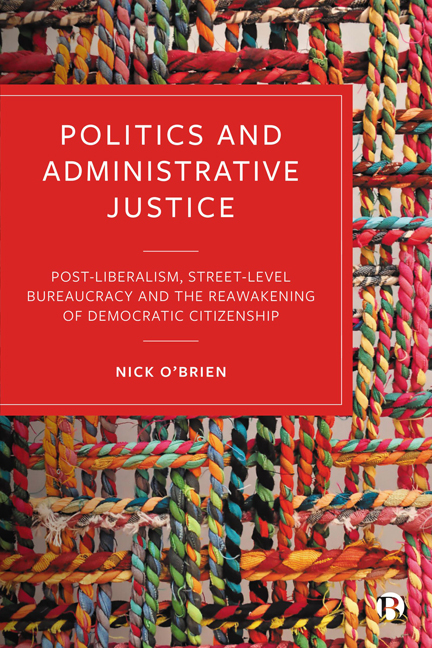 Politics and Administrative Justice
Politics and Administrative Justice Book contents
- Frontmatter
- Dedication
- Contents
- About the Author
- Acknowledgements
- 1 Introduction
- 2 Street-Level Bureaucracy and the Response to Citizen Grievance
- 3 The ‘Social Imaginary’ of Liberal Legalism
- 4 The Promise of Postliberalism
- 5 Citizen Grievance and the Spectre of Legalism
- 6 Postliberal Accountability: The Challenge of Disability Human Rights
- 7 Responding to Grievance: Mental Health and Special Educational Needs and Disability
- 8 Postliberal Administrative Justice
- 9 Conclusion
- References
- Index
1 - Introduction
Published online by Cambridge University Press: 27 March 2024
- Frontmatter
- Dedication
- Contents
- About the Author
- Acknowledgements
- 1 Introduction
- 2 Street-Level Bureaucracy and the Response to Citizen Grievance
- 3 The ‘Social Imaginary’ of Liberal Legalism
- 4 The Promise of Postliberalism
- 5 Citizen Grievance and the Spectre of Legalism
- 6 Postliberal Accountability: The Challenge of Disability Human Rights
- 7 Responding to Grievance: Mental Health and Special Educational Needs and Disability
- 8 Postliberal Administrative Justice
- 9 Conclusion
- References
- Index
Summary
The world of everyday citizen grievance is remote from the concerns of high politics and public policy, an apparently unfortunate manifestation of a ‘culture of complaint’ marked by personal disaffection, self-interest and collective alienation. The work of those whose professional lives, as street-level bureaucrats, case reviewers, mediators, tribunal members and ombudsman (‘ombud’) staff, are consumed in responding to such grievances in turn appears a necessary but largely unrewarding enterprise. Hermetically sealed from mainstream political thought, the contemporary ‘grievance culture’, occasionally interrogated for ‘lessons learned’ and ‘market surveillance’ purposes, is largely relegated to the awkward margins of polite conversation. When it percolates into political consciousness, it is likely to be in the context of rarefied debate about the constitutional implications of judicial review or the tragic drama of set-piece public inquiry, far removed from the ordinary and the quotidian.
The everyday ways of responding more routinely to citizen grievance, what might be called ‘administrative justice’ (as opposed to ‘administrative law’), are nevertheless a constantly moving target, subject to periodic adjustment and organizational tinkering. Law Commission reports, White Papers and select committee inquiries accumulate; processes for making official decisions and providing redress are constantly in flux. Yet despite national and regional variation, with notably more striking innovation in the devolved nations of the UK than in England, options for reform rarely escape the constraints of a legalistic form of consumerism. At best, citizen grievance assumes an instrumental purpose much like that of a disaffected focus group, to be managed more efficiently; at worst, it is perceived as largely irrelevant to democratic politics. Periodic change, halting and incremental, is technocratic and hygienic, the preferred recipe ‘more of the same’. When the UK Administrative Justice and Tribunals Council was abolished in 2013, together with its ambition of holistic oversight, its demise was greeted with little more than a muffled murmur of political dissent.
This book offers an alternative perspective drawn from the ordinary culture of ‘the street’, not the extraordinary ambience of judicial review in the High Court or of public inquiry. It claims for citizen grievance a measure of value that, far from being solely instrumental, is inherent to its place at the interface between street and state.
- Type
- Chapter
- Information
- Politics and Administrative JusticePostliberalism, Street-Level Bureaucracy and the Reawakening of Democratic Citizenship, pp. 1 - 11Publisher: Bristol University PressPrint publication year: 2023


